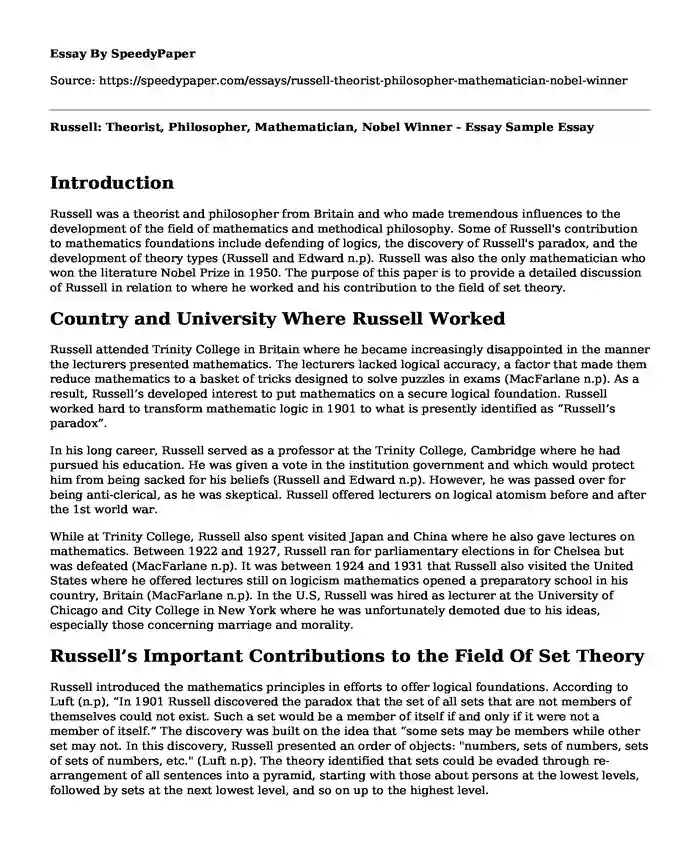
| Type of paper: | Essay |
| Categories: | Philosophy |
| Pages: | 3 |
| Wordcount: | 599 words |
Introduction
Russell was a theorist and philosopher from Britain and who made tremendous influences to the development of the field of mathematics and methodical philosophy. Some of Russell's contribution to mathematics foundations include defending of logics, the discovery of Russell's paradox, and the development of theory types (Russell and Edward n.p). Russell was also the only mathematician who won the literature Nobel Prize in 1950. The purpose of this paper is to provide a detailed discussion of Russell in relation to where he worked and his contribution to the field of set theory.
Country and University Where Russell Worked
Russell attended Trinity College in Britain where he became increasingly disappointed in the manner the lecturers presented mathematics. The lecturers lacked logical accuracy, a factor that made them reduce mathematics to a basket of tricks designed to solve puzzles in exams (MacFarlane n.p). As a result, Russell’s developed interest to put mathematics on a secure logical foundation. Russell worked hard to transform mathematic logic in 1901 to what is presently identified as “Russell’s paradox”.
In his long career, Russell served as a professor at the Trinity College, Cambridge where he had pursued his education. He was given a vote in the institution government and which would protect him from being sacked for his beliefs (Russell and Edward n.p). However, he was passed over for being anti-clerical, as he was skeptical. Russell offered lecturers on logical atomism before and after the 1st world war.
While at Trinity College, Russell also spent visited Japan and China where he also gave lectures on mathematics. Between 1922 and 1927, Russell ran for parliamentary elections in for Chelsea but was defeated (MacFarlane n.p). It was between 1924 and 1931 that Russell also visited the United States where he offered lectures still on logicism mathematics opened a preparatory school in his country, Britain (MacFarlane n.p). In the U.S, Russell was hired as lecturer at the University of Chicago and City College in New York where he was unfortunately demoted due to his ideas, especially those concerning marriage and morality.
Russell’s Important Contributions to the Field Of Set Theory
Russell introduced the mathematics principles in efforts to offer logical foundations. According to Luft (n.p), “In 1901 Russell discovered the paradox that the set of all sets that are not members of themselves could not exist. Such a set would be a member of itself if and only if it were not a member of itself.” The discovery was built on the idea that “some sets may be members while other set may not. In this discovery, Russell presented an order of objects: "numbers, sets of numbers, sets of sets of numbers, etc." (Luft n.p). The theory identified that sets could be evaded through re-arrangement of all sentences into a pyramid, starting with those about persons at the lowest levels, followed by sets at the next lowest level, and so on up to the highest level.
Russell's system functioned as a pathway for the first validations of mathematics foundations. Up to date, the set theory by Russell is still applied in computer science braches and philosophical investigations. The set theory by Russell emphasizes that of all statements are categorized in a hierarchy based on their level of focus, then “the set of all sets that are not members of themselves can be avoided” (Luft n.p).
Works Cited
Russell, Burrows L. Bertrand, and Edward N. Zalta. "Stanford Encyclopedia of Philosophy." (2013).
Luft, Erick. "Bertrand Russell and the Paradoxes of Set Theory." Encyclopedia.com | Free Online Encyclopedia, 15 Apr. 2020, www.encyclopedia.com/science/encyclopedias-almanacs-transcripts-and-maps/bertrand-russell-and-paradoxes-set-theory.
MacFarlane, Alistair. "Bertrand Russell (1872-1970)." Philosophy Now | a Magazine of Ideas, 2012, philosophynow.org/issues/89/Bertrand_Russell_1872-1970.
Cite this page
Russell: Theorist, Philosopher, Mathematician, Nobel Winner - Essay Sample. (2023, Aug 14). Retrieved from https://speedypaper.net/essays/russell-theorist-philosopher-mathematician-nobel-winner
Request Removal
If you are the original author of this essay and no longer wish to have it published on the SpeedyPaper website, please click below to request its removal:
- Free Essay: Allegory of the Cave Meaning
- Free Essay on Philosophers: Thomas Hobbes and Rene Descartes
- Essay Example on Aristotle Biography
- Utilitarian and Kantian Ethics - Essay Sample
- Essay Sample on Intriguing Questions
- Socrates: Accept Fate & Embrace Death with Peace - Essay Sample
- Essay Sample on Exploring Aristotle's Views on Friendship: Utility, Pleasure, and Virtue
Popular categories




